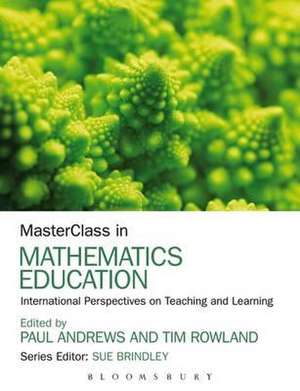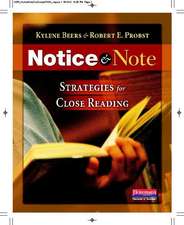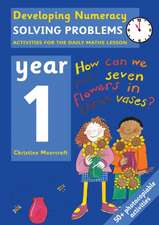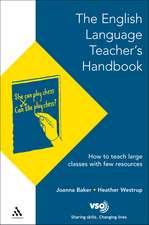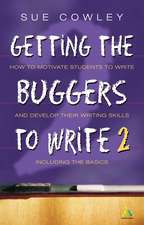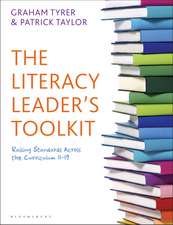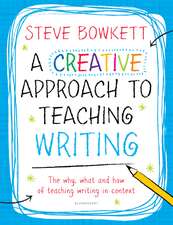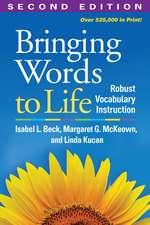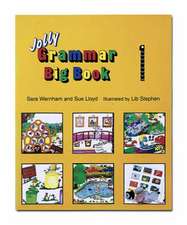MasterClass in Mathematics Education: International Perspectives on Teaching and Learning: MasterClass
Editat de Paul Andrews, Dr Tim Rowland Sue Brindleyen Limba Engleză Paperback – 20 noi 2013
| Toate formatele și edițiile | Preț | Express |
|---|---|---|
| Paperback (1) | 266.39 lei 6-8 săpt. | |
| Bloomsbury Publishing – 20 noi 2013 | 266.39 lei 6-8 săpt. | |
| Hardback (1) | 1009.65 lei 6-8 săpt. | |
| Bloomsbury Publishing – 20 noi 2013 | 1009.65 lei 6-8 săpt. |
Preț: 266.39 lei
Nou
Puncte Express: 400
Preț estimativ în valută:
50.97€ • 53.37$ • 42.28£
50.97€ • 53.37$ • 42.28£
Carte tipărită la comandă
Livrare economică 10-24 aprilie
Preluare comenzi: 021 569.72.76
Specificații
ISBN-13: 9781441179753
ISBN-10: 1441179755
Pagini: 240
Ilustrații: 13
Dimensiuni: 189 x 246 x 13 mm
Greutate: 0.48 kg
Editura: Bloomsbury Publishing
Colecția Bloomsbury Academic
Seria MasterClass
Locul publicării:London, United Kingdom
ISBN-10: 1441179755
Pagini: 240
Ilustrații: 13
Dimensiuni: 189 x 246 x 13 mm
Greutate: 0.48 kg
Editura: Bloomsbury Publishing
Colecția Bloomsbury Academic
Seria MasterClass
Locul publicării:London, United Kingdom
Caracteristici
Draws together contributions from internationally respected authorities in the field from around the world
Notă biografică
Paul Andrews is Professor of Mathematics Education at the University of Stockholm, Sweden. He is a co-editor of the Cambridge Journal of Education.Tim Rowland is Professor of Mathematics Education at the University of East Anglia, UK, and Emeritus Reader in Mathematics Education at the University of Cambridge, UK. Tim is Chair of the Joint Mathematical Council of the United Kingdom, and joint editor of the journal Research in Mathematics Education.
Cuprins
Notes on ContributorsSeries Editor's Preface, Sue Brindley (University of Cambridge, UK)Preface, Paul Andrews (University of Stockholm, Sweden) and Tim Rowland (University of Cambridge, UK)Part I: Issues in Mathematics Education1. What is Mathematics, and Why Learn It?, Paul Ernest (Exeter University, UK, and Brunel University, UK)2. Learning and Knowing Mathematics, Stephen Lerman (London South Bank University, UK)3. Improving Assessment in School Mathematics, Jeremy Hodgen (King's College London, UK) and Marja van den Heuvel-Panhuizen (Utrecht University, The Netherlands)4. Integrating New Technologies into School Mathematics, Kenneth Ruthven (University of Cambridge, UK)5. Mathematics Textbooks and How They Are Used, Sebastian Rezat (Justus-Liebig-University Giessen, Germany) and Rudolf Straesser (Justus-Liebig-University Giessen, Germany)6. The Affective Domain, Günter Törner (University of Duisburg- Essen, Germany)7. Mathematics and Language, Richard Barwell (University of Ottawa, Canada)8. Mathematics Teacher Knowledge, Tim Rowland (University of Cambridge, UK)Part II: Aspects of Mathematics Curriculum9. Proof, Andreas Styliandes (University of Cambridge, UK)10. Mathematical Problem Solving, Lieven Verschaffel (University of Leuven, Belgium), Wim Van Dooren (University of Leuven, Belgium) and Fien Depaepe (University of Leuven, Belgium)11. Algebra, Daniel Chazan (University of Maryland, USA)12. Arithmetic, Julia Anghileri (University of Cambridge, UK)13. Geometry, Angel Gutierrez (Universidad de Valencia, Spain)14. Probability, Dave Pratt (Institute of Education, University of London, UK)Part III: Comparative Mathematics Education15. European Mathematics Curricula and Classroom Practices, Paul Andrews (University of Stockholm, Sweden)16. Teaching and Learning Mathematics in Chinese Culture, Ngai-Ying Wong (Chinese University of Hong Kong, Hong Kong)17. Classroom Culture and Mathematics Learning, Eva Jablonka (Lulea University of Technology, Sweden)Index
Recenzii
This volume constitutes a Masters-level introduction to research on mathematics education, as it is done in the UK and the "Anglosphere" at large. Each of the 17 chapters is written by distinguished scholars, and provides a personal and stringent overview of a specific research theme, based on a few carefully chosen references.
Seventeen chapters take the reader to the heart of seventeen key issues. A great companion for students embarking on academic study in mathematics education.
This book provides an insightful overview of many of the key issues in mathematics education. Written by key educators in the field, it is an essential resource for all those with a deep interest in developing an effective and enriched approach to the teaching and learning of mathematics.
This is a very interesting and instructive book, useful for every student, teacher and researcher of mathematics education. It gives a deep insight on some general and actual questions of mathematics teaching as well as on teaching some concrete mathematical topics - based on contemporary research, embedded in an international context.
Each of the chapters in this excellent collection addresses a key issue in mathematics education by presenting and discussing a set of core readings, i.e. significant papers published previously on the issue in question. This allows the authors, all prominent researchers in their respective fields, to sum up important research findings as well as to highlight different aspects of the research process such as the purposes of mathematics education research, the significance of methodological and theoretical choices for the questions asked and for the results obtained, and the relationships between findings based on different theoretical and methodological approaches. This dual emphasis on the results obtained and the research process makes it highly recommendable for all students who need an introduction to mathematics education research.
This book is a threshold for readers who are embarking on higher degree study in mathematics education. The authors, who are world-class researchers, have provided accessible and deeply knowledgeable chapters that draw readers into the central concerns of this field of research - which are also the central concerns of practice.
With its intriguing blend of core concepts and innovative ideas, this timely volume presents a judicious review of the major content domains of interest to any mathematics teachers embarking on a research career. I was particularly struck by the creative way the authors use content aspects to address salient wider issues. The volume will also prove indispensable to mathematics educators when building core courses and as a stimulus for critical thinking and further study. This book should be on the shelves of every aspiring mathematics education teacher.
Readers of this book will not only feel like learners beginning a challenging scientific adventure, but also like members of a mathematics education research community. Social activities of human beings are characterized by the constant presence of some core questions: what, why, how. Using a friendly and current approach, this book addresses the mentioned questions concerning teaching and learning mathematics.
This book constitutes a very useful entry point in the world of research in mathematics education. Besides the fact that the authors of individual chapters are themselves well recognized researchers, each one comments on seminal previous work on that topic, leading the reader to get a grasp of classical works and of major current issues. Specific topics of mathematics curriculum, teaching and learning in different countries are addressed through the identification of key issues, seminal papers, and current debates by an outstanding team of active researchers in mathematics education. I find this very readable book a most suitable entry point in the world of research in mathematics education for all those who want to get acquainted with this academic field and its practical implications.
MasterClass in Mathematics Education provides a broad overview of issues that are important within contemporary mathematics education. Educational, curricular and cultural issues are dealt with across an informative array of chapters written by authors from several countries with enthusiasm and expertise in their respective specialist areas. The writing is accessible and the book provides introductions to key features that play out within the teaching and learning of mathematics. Pre- and in-service teachers and postgraduate students in mathematics education will find the contents useful as a source book that lays central issues on the table, and points to broader research findings relating to these issues. I will certainly keep a copy on my bookshelf!
Each chapter reviews several core research studies in a specific sub-domain of mathematics education. This in itself can serve as an extremely useful starting point to those who wish to learn about the specific domain. Also, in many cases the review is more than a summary; it provides a general view of the domain and situates the core research studies within it. Moreover, in the vast majority of the chapters gaps in our current knowledge as a research community on the specific domain are highlighted, directions for further readings are provided and possible new avenues for study are directed. Hence I recommend the book to be a cornerstone in our field.
This well-written edited volume covers central issues in the field of mathematics education from different theoretical, international and epistemological perspectives. In particular, it illustrates very clearly the need for "complementarity" of theoretical frameworks and methods in order to address the complexity of mathematics learning and teaching around the world. 21 experts have contributed indicating the development of the research, its current state and its impact on mathematics teaching and learning. This book is more than a selection of review chapters on specific areas. It is based on a very good selection of core readings, it offers interesting practice-based examples illustrating difficult theoretical and methodological matters, and it includes reading lists providing resources for extending our knowledge of the field. Graduate students, young researchers and all practitioners (teachers and educators) that attempt to investigate critical questions related to mathematics teaching and learning will find this book very interesting and helpful to their practice.
This book is an unrivalled introduction to the field of mathematics education. Scholars from around the world, at the forefront of the field, have offered consistently high-quality and accessible chapters, starting from core readings and setting out the key themes, findings and challenges in their particular research domains. The range of issues covered is exhaustive. This book is essential reading for anyone studying mathematics education.
MasterClass in Mathematics Education is an important and useful book for anyone who has an interest in mathematics education. This book does exactly what is says in the title. It clearly gives today's broader image of mathematics education research. Editors and authors of each chapter are well recognized researchers in mathematics education and experts in the topics that they address. In each chapter, they analyse in a few pages the main ideas of each topic that they address and offer the opportunity to the reader to reflect on the ideas presented. They achieve this by synthesizing in a critical way a careful selection of core readings. I warmly recommend this book. It is a must-read for everyone in mathematics education. Expert researchers can reflect on the ideas presented, new researchers can get a comprehensive idea of the field and teachers can be inspired by the ideas presented and apply them in their classrooms. Without doubt this book will be one of the compulsory readings in my courses for the teaching and learning of mathematics.
[The book] contains a wealth of information and continually directs the reader towards further studies ... All in all, an excellent book. A true Masterclass in Mathematics Education
Seventeen chapters take the reader to the heart of seventeen key issues. A great companion for students embarking on academic study in mathematics education.
This book provides an insightful overview of many of the key issues in mathematics education. Written by key educators in the field, it is an essential resource for all those with a deep interest in developing an effective and enriched approach to the teaching and learning of mathematics.
This is a very interesting and instructive book, useful for every student, teacher and researcher of mathematics education. It gives a deep insight on some general and actual questions of mathematics teaching as well as on teaching some concrete mathematical topics - based on contemporary research, embedded in an international context.
Each of the chapters in this excellent collection addresses a key issue in mathematics education by presenting and discussing a set of core readings, i.e. significant papers published previously on the issue in question. This allows the authors, all prominent researchers in their respective fields, to sum up important research findings as well as to highlight different aspects of the research process such as the purposes of mathematics education research, the significance of methodological and theoretical choices for the questions asked and for the results obtained, and the relationships between findings based on different theoretical and methodological approaches. This dual emphasis on the results obtained and the research process makes it highly recommendable for all students who need an introduction to mathematics education research.
This book is a threshold for readers who are embarking on higher degree study in mathematics education. The authors, who are world-class researchers, have provided accessible and deeply knowledgeable chapters that draw readers into the central concerns of this field of research - which are also the central concerns of practice.
With its intriguing blend of core concepts and innovative ideas, this timely volume presents a judicious review of the major content domains of interest to any mathematics teachers embarking on a research career. I was particularly struck by the creative way the authors use content aspects to address salient wider issues. The volume will also prove indispensable to mathematics educators when building core courses and as a stimulus for critical thinking and further study. This book should be on the shelves of every aspiring mathematics education teacher.
Readers of this book will not only feel like learners beginning a challenging scientific adventure, but also like members of a mathematics education research community. Social activities of human beings are characterized by the constant presence of some core questions: what, why, how. Using a friendly and current approach, this book addresses the mentioned questions concerning teaching and learning mathematics.
This book constitutes a very useful entry point in the world of research in mathematics education. Besides the fact that the authors of individual chapters are themselves well recognized researchers, each one comments on seminal previous work on that topic, leading the reader to get a grasp of classical works and of major current issues. Specific topics of mathematics curriculum, teaching and learning in different countries are addressed through the identification of key issues, seminal papers, and current debates by an outstanding team of active researchers in mathematics education. I find this very readable book a most suitable entry point in the world of research in mathematics education for all those who want to get acquainted with this academic field and its practical implications.
MasterClass in Mathematics Education provides a broad overview of issues that are important within contemporary mathematics education. Educational, curricular and cultural issues are dealt with across an informative array of chapters written by authors from several countries with enthusiasm and expertise in their respective specialist areas. The writing is accessible and the book provides introductions to key features that play out within the teaching and learning of mathematics. Pre- and in-service teachers and postgraduate students in mathematics education will find the contents useful as a source book that lays central issues on the table, and points to broader research findings relating to these issues. I will certainly keep a copy on my bookshelf!
Each chapter reviews several core research studies in a specific sub-domain of mathematics education. This in itself can serve as an extremely useful starting point to those who wish to learn about the specific domain. Also, in many cases the review is more than a summary; it provides a general view of the domain and situates the core research studies within it. Moreover, in the vast majority of the chapters gaps in our current knowledge as a research community on the specific domain are highlighted, directions for further readings are provided and possible new avenues for study are directed. Hence I recommend the book to be a cornerstone in our field.
This well-written edited volume covers central issues in the field of mathematics education from different theoretical, international and epistemological perspectives. In particular, it illustrates very clearly the need for "complementarity" of theoretical frameworks and methods in order to address the complexity of mathematics learning and teaching around the world. 21 experts have contributed indicating the development of the research, its current state and its impact on mathematics teaching and learning. This book is more than a selection of review chapters on specific areas. It is based on a very good selection of core readings, it offers interesting practice-based examples illustrating difficult theoretical and methodological matters, and it includes reading lists providing resources for extending our knowledge of the field. Graduate students, young researchers and all practitioners (teachers and educators) that attempt to investigate critical questions related to mathematics teaching and learning will find this book very interesting and helpful to their practice.
This book is an unrivalled introduction to the field of mathematics education. Scholars from around the world, at the forefront of the field, have offered consistently high-quality and accessible chapters, starting from core readings and setting out the key themes, findings and challenges in their particular research domains. The range of issues covered is exhaustive. This book is essential reading for anyone studying mathematics education.
MasterClass in Mathematics Education is an important and useful book for anyone who has an interest in mathematics education. This book does exactly what is says in the title. It clearly gives today's broader image of mathematics education research. Editors and authors of each chapter are well recognized researchers in mathematics education and experts in the topics that they address. In each chapter, they analyse in a few pages the main ideas of each topic that they address and offer the opportunity to the reader to reflect on the ideas presented. They achieve this by synthesizing in a critical way a careful selection of core readings. I warmly recommend this book. It is a must-read for everyone in mathematics education. Expert researchers can reflect on the ideas presented, new researchers can get a comprehensive idea of the field and teachers can be inspired by the ideas presented and apply them in their classrooms. Without doubt this book will be one of the compulsory readings in my courses for the teaching and learning of mathematics.
[The book] contains a wealth of information and continually directs the reader towards further studies ... All in all, an excellent book. A true Masterclass in Mathematics Education
